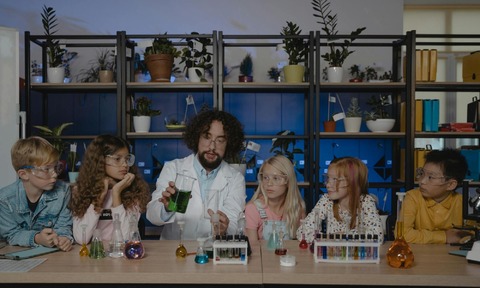National curriculum ‘biggest threat to practical science in schools’ warns survey
18 May 2025

The demands of the national curriculum are the greatest obstacle to providing the hands-on lessons necessary to interest children in science, claims a report from a leading engineering association.
EngineeringUK’s latest School report: Barriers to practical science surveyed hundreds of teachers on the challenges they face in providing practical STEM lessons.
Respondents blamed four key factors including time constraints, student behaviour and equipment issues but the highest percentage (44%) cited curriculum demands.
EngineeringUK head of research Becca Gooch said the organisation’s Science Education Tracker project, organised with the Royal Society, had previously highlighted that science practicals were “critically vital” to motivate secondary age pupils in years 7 to 9.
“Hands-on practicals help bring science to life for young people and boost interest in science as well as developing important skills,” stressed Gooch.
“We need more young people, especially girls, choosing to continue with science and progress into engineering and technology careers. So, we need school students to have many more opportunities to get hands-on in their science lessons.”
She added that it was a matter of record that the frequency of hands-on lessons had dropped within the last decade.
In 2016, 44% of GCSE students performed practical learning for a minimum of once every two weeks. Even prior to lockdown, the percentage had declined, said Engineering UK, with more emphasis on video learning and teacher demonstrations.
By 2019, one year before the pandemic, 37% of GCSE scholars had fortnightly practicals; by 2023 this had further reduced to 26%.
Chair of the Royal Society’s education committee, professor Ulrike Tillmann, warned that hands-on science activities were becoming “increasingly marginalised”.
She added that this would impact student engagement and understanding of the relevance of science to their lives.
“Experimentation and practical work have always been at the heart of scientific inquiry,” stated Tillmann.
“Not only do they provide a tangible way to connect what we learn in the classroom to the real world, but they also help with problem solving, teamwork and many other invaluable skills needed for pupils to thrive as future citizens.”
In the conclusion to the recently released report, the authors called on government to address in the forthcoming education assessment review the threat the volume of curriculum content posed to science learning.
They further proposed that practical activity should comprise half of all science lessons and that more resources be made available to ensure schools had necessary equipment.
Early stage school science plays an important role, although the EngineeringUK report stresses the vital importance of practical lessons at the early secondary stage. (Pic: Tima Miroshnichenko)

